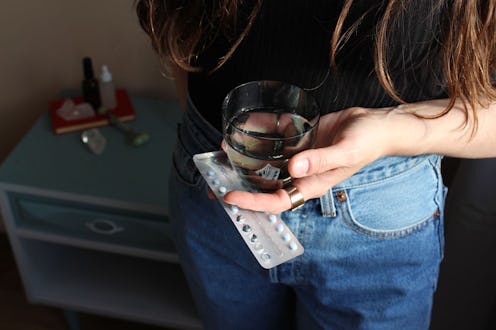Life
This Is How Often A Break From Your Contraceptive Pill Is Actually Necessary

As beautiful as Mother Nature can be, she sure knows how to cause a fuss during a certain portion of the month. But thanks to the invention of the combined oral contraceptive pill (or just "the pill") — a form of combined hormonal contraception (CHC) — periods can become more manageable and less painful. However, as helpful as these medications may be, there is still confusion around how and when to take them. So, how often should you take a break from the pill?
According to recent guidance collated by the Faculty of Sexual and Reproductive Healthcare (FSRH), taking the pill continuously without a break will not result in any adverse effects.
"The evidence from studies is that combined hormonal contraception (CHC) is as safe and at least as effective for contraception if it is taken as an extended or continuous regimen as it is when it is taken in a traditional 21/7 cycle," the FSRH states. In addition, "the evidence from studies is that using extended or continuous regimens of CHC does not affect" fertility once that person "stops CHC."
The FSRH also states that it may even help people "reduce the risk of getting pregnant on [CHC]," if they take fewer or shorter breaks from the pill, as "the riskiest time to miss pills is at the beginning and the end of a pill-free interval."
That's not to say that taking the pill without a week-long break is necessary for everyone, but this new info may provide peace of mind to those who opt for a continuous cycle (or are recommended it by their GP). However, there are experts that dispute whether a break is necessary at all. For example, Professor John Guillebaud, the emeritus professor of family planning and reproductive health at University College London, has argued that the 21/7 method of taking the pill is "outdated," GP Online reports. According to Guillebaud, implementing breaks can reduce the efficiency of the pill by "un-suppressing the ovary and allowing some follicular activity to return."
And some experts believe a continuous regimen can have beneficial results, such as consultant gynaecologist Mr Narendra Pisa, who points to the fact that "taking the pill continuously" is easier to remember. In addition, "by blocking the periods completely, it also improves a lot of period-related symptoms such as heavy bleeding, pain and anaemia," he told the Express. "Taking it continuously is also known to improve conditions such as endometriosis, adenomyosis and menorrhagia."
Pisal is aware that some people feel reassurance in experiencing a monthly period, however. He makes clear that while "taking a break does not make the adverse effects any worse or more common (such as headaches, sleep issues)," it may cause some people to experience "cramping during periods," as well as "mood swings when the hormones are withdrawn during a break."
If people experience these symptoms while on their seven-day break, staying on an ongoing regimen "would improve the cramping and also the mood swings," Pisal stated.
And while it's tempting to make a decision here and now about the method in which you'll take your pill, you must wait and consult your GP first. "With all medication, you should always follow the advice given by your doctor," GP Dr Jane Leonard told the Express.